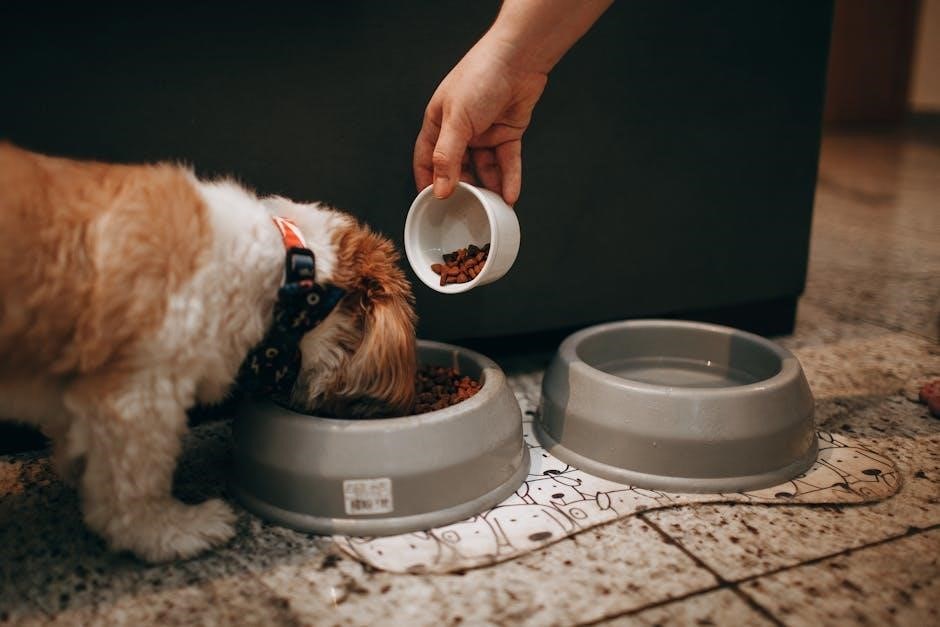
Proper nutrition is vital for puppies’ rapid growth and development. This section introduces the Advance Puppy Food Feeding Guide, a science-backed resource to ensure optimal health through tailored feeding plans.
1.1 Importance of Proper Nutrition for Puppies
Proper nutrition is crucial for puppies, supporting their rapid growth, energy levels, and immune system development. A balanced diet ensures optimal health, while poor nutrition can lead to developmental issues. High-quality puppy food, like Advance Puppy Food, provides essential nutrients for healthy brain development, digestive health, and overall well-being, setting the foundation for a thriving adult dog.
1.2 Overview of the Advance Puppy Food Feeding Guide
The Advance Puppy Food Feeding Guide provides a comprehensive resource for puppy owners, offering feeding charts tailored to size and age. It includes recommendations for portion sizes, frequency, and adjusting meals as puppies grow. The guide also covers tips for combining wet and dry food, ensuring balanced nutrition for optimal development and health.
Understanding Your Puppy’s Nutritional Needs
Puppies require essential nutrients like protein, fats, vitamins, and minerals for growth. High-quality puppy food ensures these needs are met, supporting energy and development.
2.1 Key Nutrients for Puppy Development
Puppies require key nutrients for healthy growth. High-quality protein supports muscle development, while DHA aids brain function. Calcium strengthens bones, and vitamins boost overall health. Advance Puppy Food provides these essentials, ensuring optimal growth and energy levels.
2.2 Role of High-Quality Puppy Food
High-quality puppy food plays a crucial role in ensuring proper growth and development. It provides tailored nutrition, supporting energy levels and overall health. Advance Puppy Food is specifically formulated to meet developmental needs, promoting easy digestion and brain development. Feeding guides on packaging offer a clear starting point for owners to ensure their puppies receive balanced meals.

The Advance Puppy Food Feeding Guide is a science-backed resource providing tailored feeding recommendations to support puppies’ growth and digestion for optimal health.
3.1 Feeding Charts Based on Puppy Size and Age
Feeding charts for puppies are tailored to their size and age, ensuring proper growth. For example, a 10kg adult weight puppy needs 1 cup/day at 2 months, increasing to 1.2 cups/day by 4 months. Medium breeds (15kg adult) start with 1.2 cups/day at 2 months, rising to 1.5 cups/day at 4 months. Large breeds (20kg adult) require 2 cups/day at 2 months, adjusting to 2.2 cups/day at 4 months. Use a standard 250ml cup for accuracy, and adjust portions based on growth stages to prevent overfeeding. Always refer to the specific feeding guide on Advance Puppy Food packaging for precise measurements.
3.2 How to Adjust Portions for Optimal Growth
Monitor your puppy’s growth and adjust feeding portions accordingly. Use the feeding charts as a baseline, measuring with a 250ml cup. For mixed feeding, halve the recommended amounts of both wet and dry food. Gradually increase portions as your puppy grows, ensuring not to overfeed. Adjustments should align with developmental stages and individual needs, following the guidance on Advance Puppy Food packaging.
Wet vs. Dry Puppy Food
Deciding between wet and dry puppy food involves considering moisture content, digestibility, and convenience. Wet food supports hydration, while dry food aids in dental health and is cost-effective. Both options can be combined for a balanced diet tailored to your puppy’s needs and preferences.
4.1 Benefits of Wet Food for Puppies
Wet puppy food offers high moisture content, supporting hydration and digestive health. It is often more palatable, encouraging appetite in picky eaters. Wet food can aid puppies with sensitive stomachs or dental issues. Additionally, it provides essential nutrients in a form that mimics natural diets. Advance Puppy Wet Food is formulated to meet developmental needs, promoting healthy growth and energy levels in growing puppies.
4.2 Benefits of Dry Food for Puppies
Dry food is convenient and cost-effective, with a longer shelf life. It helps maintain dental health by reducing tartar buildup. High-quality dry puppy food, like Advance Puppy Dry Food, provides balanced nutrition tailored to growth stages. It supports energy levels and is suitable for large breeds, promoting healthy bone development and overall well-being in puppies.
4.3 Combining Wet and Dry Food
Combining wet and dry food provides balanced nutrition and variety. Wet food adds moisture and flavor, while dry food supports dental health. For optimal results, halve portions of each when mixing, as per the Advance feeding guide. This approach promotes hydration, supports digestion, and ensures puppies receive essential nutrients without overfeeding, aligning with their developmental needs.
Transitioning from Puppy to Adult Food
Transitioning to adult food depends on breed, size, and development. Gradually switch over 7-10 days to prevent digestive upset, ensuring a smooth shift to adult nutrition.
5.1 When to Stop Feeding Puppy Food
Stop feeding puppy food when your dog reaches maturity, typically between 12-18 months, depending on breed and size. Larger breeds may need puppy food longer, while smaller breeds transition sooner. Consult your vet to determine the exact time based on your dog’s growth and development stage.
5.2 Gradual Transition Tips
Start by mixing a small amount of adult food with puppy food, gradually increasing the proportion over 7-10 days. Monitor your puppy’s digestion and energy levels. If issues arise, slow the transition. Ensure fresh water is always available to aid digestion. Consult your vet if your puppy shows signs of discomfort or refusal to eat.

Breed-Specific Feeding Recommendations
Feeding needs vary by breed size and type. Use feeding charts tailored to small, medium, or large breeds to ensure optimal growth and digestive health for your puppy.
6.1 Feeding Guidelines for Small Breeds
Small breeds require tailored feeding plans due to their rapid growth and high metabolism. For puppies expected to weigh under 10kg, start with 20g at 2 months, increasing to 30g by 4 months. Use high-quality puppy food formulated for small breeds to support digestive health and energy needs. Adjust portions based on growth stages to prevent overfeeding.
6.2 Feeding Guidelines for Medium and Large Breeds
For medium and large breeds, adjust portions based on age and expected adult weight. Puppies weighing 15kg as adults need 1.2 cups/day at 4 months, while 20kg puppies require 2.2 cups/day. Refer to the Advance Puppy Food feeding charts for precise measurements. High-quality puppy food supports joint and muscle development, ensuring robust growth in larger breeds.

The Role of Water in Puppy Feeding
Water is essential for hydration and digestion. Ensure fresh water is always available to support optimal water turnover and digestive health, promoting overall puppy well-being and energy levels.
7.1 Ensuring Proper Hydration
Proper hydration is crucial for a puppy’s health, supporting digestion, metabolism, and energy levels. Always provide fresh, clean water to prevent dehydration and urinary tract issues. Place water bowls in accessible locations and refresh them daily to encourage consistent intake. Monitoring water consumption helps maintain balance, ensuring your puppy stays healthy and active throughout growth stages.
7.2 Water Intake and Digestive Health
Water is essential for digestion, preventing dehydration, and maintaining urinary health. Ensure fresh water is always available to support nutrient absorption and prevent digestive issues. Proper hydration helps puppies process their food efficiently, reducing the risk of constipation or diarrhea. Monitoring water intake alongside feeding schedules ensures a balanced digestive system for optimal growth and overall well-being.
Monitoring Your Puppy’s Growth
Regular check-ups and measuring weight and development are crucial. The Advance Puppy Food Feeding Guide helps identify healthy growth signs, ensuring proper adjustments for optimal health and development.
8.1 Signs of Healthy Growth
Monitoring your puppy’s growth involves tracking weight, development, and overall health. Healthy growth is marked by steady weight gain, shiny coat, high energy, and proper digestion. Ensure your puppy meets developmental milestones, such as teeth eruption and improved mobility. Regular weigh-ins and vet check-ups help confirm progress, guiding adjustments to the feeding plan for optimal growth.
8.2 Adjusting Feeding Portions Based on Growth Stages
As your puppy grows, adjust portions according to age and size. Use the feeding guide on the packaging as a baseline, increasing or decreasing amounts based on weight checks. For example, at 2 months, feed 1 cup/day for a 10kg adult weight, increasing to 1.2 cups/day at 4 months. Monitor growth and adjust to prevent overfeeding or underfeeding, ensuring optimal development.
Preventing Overfeeding and Obesity
Monitor your puppy’s food intake to avoid overfeeding. Use the feeding guide to track portions and ensure meals are balanced. Avoid excessive treats and snacks to maintain a healthy weight, promoting overall wellness and preventing obesity-related issues.
9.1 Recognizing Signs of Overfeeding
Recognizing signs of overfeeding is crucial for maintaining your puppy’s health. Look for weight gain, lethargy, or digestive issues like diarrhea. Monitor portion sizes using the Advance Puppy Food Feeding Guide and ensure meals are balanced. Excessive treats or snacks can lead to obesity, so track intake carefully to prevent these issues and support healthy growth.
9.2 Maintaining a Healthy Weight
Maintaining a healthy weight is essential for your puppy’s well-being. Use the Advance Puppy Food Feeding Guide to determine appropriate portions based on age, size, and breed. Regularly monitor growth stages and adjust food intake to prevent overfeeding. Ensure your puppy stays active and avoid excessive treats to support a balanced and healthy weight throughout development.

Common Feeding Mistakes to Avoid
Common feeding mistakes include overfeeding, underfeeding, and introducing foods too quickly. Always follow the Advance Puppy Food Feeding Guide to avoid these errors and ensure balanced nutrition.
10.1 Overfeeding or Underfeeding
Overfeeding can lead to obesity and health issues, while underfeeding may stunt growth. Use the Advance Puppy Food Feeding Guide to determine the right portions based on age, weight, and breed size. Monitor your puppy’s growth stages and adjust feeding amounts gradually to maintain a healthy weight and ensure proper development.
10.2 Introducing Foods Too Quickly
Introducing new foods too quickly can upset your puppy’s digestive system. Gradual transitions are key to preventing issues like diarrhea or vomiting. When switching foods, mix increasing amounts of the new food with the old over 7-10 days. This allows your puppy’s system to adapt smoothly. Always follow the Advance Puppy Food Feeding Guide for a balanced approach.
A well-balanced diet and consistent feeding schedule are crucial for your puppy’s health. Always follow the Advance Puppy Food Feeding Guide and ensure fresh water is available. Monitor growth, avoid overfeeding, and transition foods gradually for optimal results. Patience and adherence to guidelines will support your puppy’s journey to adulthood.
11.1 Summary of Key Feeding Principles
Proper nutrition is the foundation of a puppy’s healthy development. Use high-quality food like Advance Puppy Food, following the feeding guide for portion sizes based on age and weight. Ensure fresh water is always available and avoid overfeeding. Monitor growth stages and adjust portions as needed. Consistency and patience are key to raising a thriving, well-nourished puppy.
11.2 Importance of Consistency and Patience
Consistency in feeding schedules and portion sizes ensures steady growth and prevents digestive issues. Patience is key as puppies develop at different rates. Stick to the Advance Puppy Food Feeding Guide and gradually adjust portions as your puppy grows. Avoid sudden changes and always provide fresh water for optimal health and balanced development.